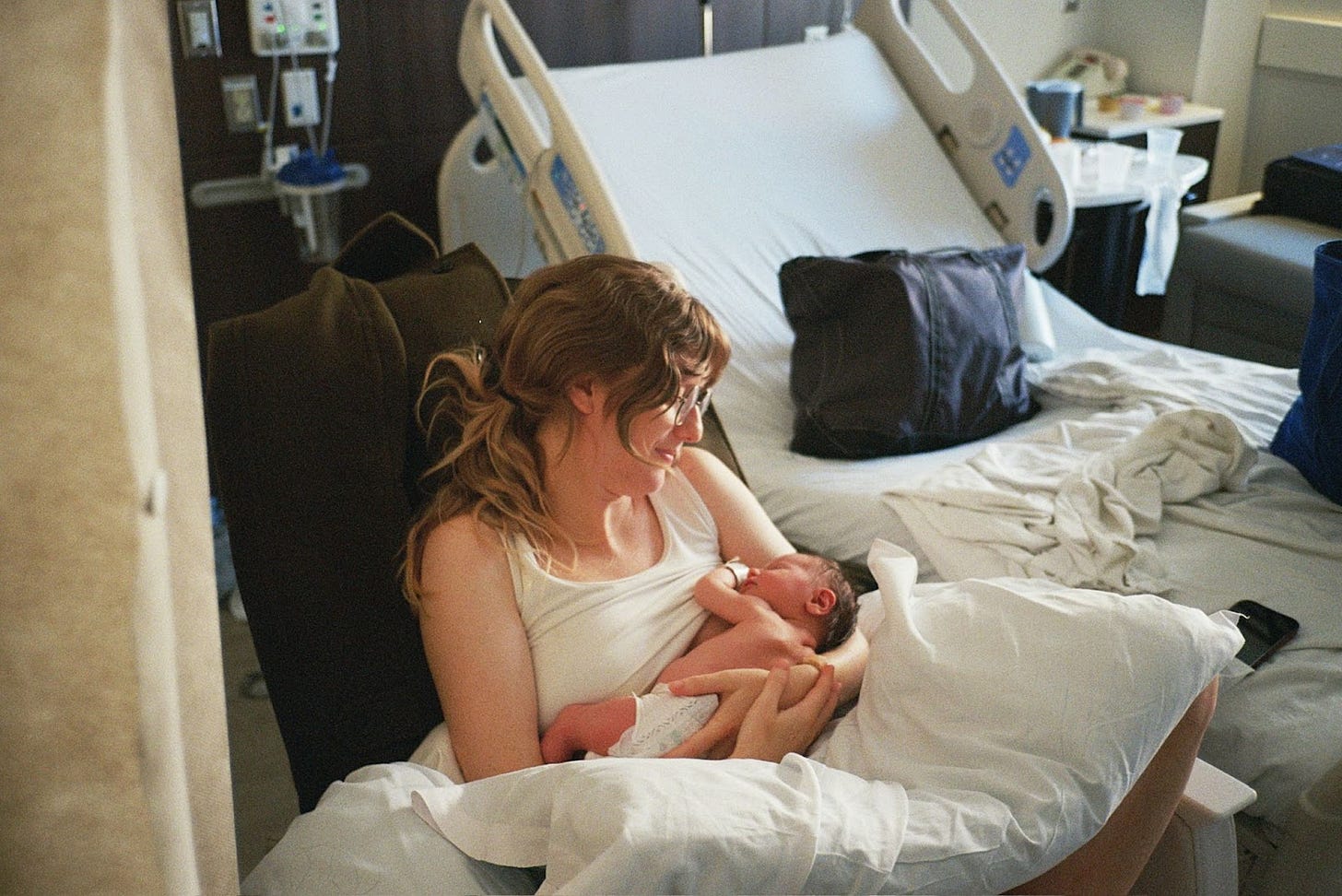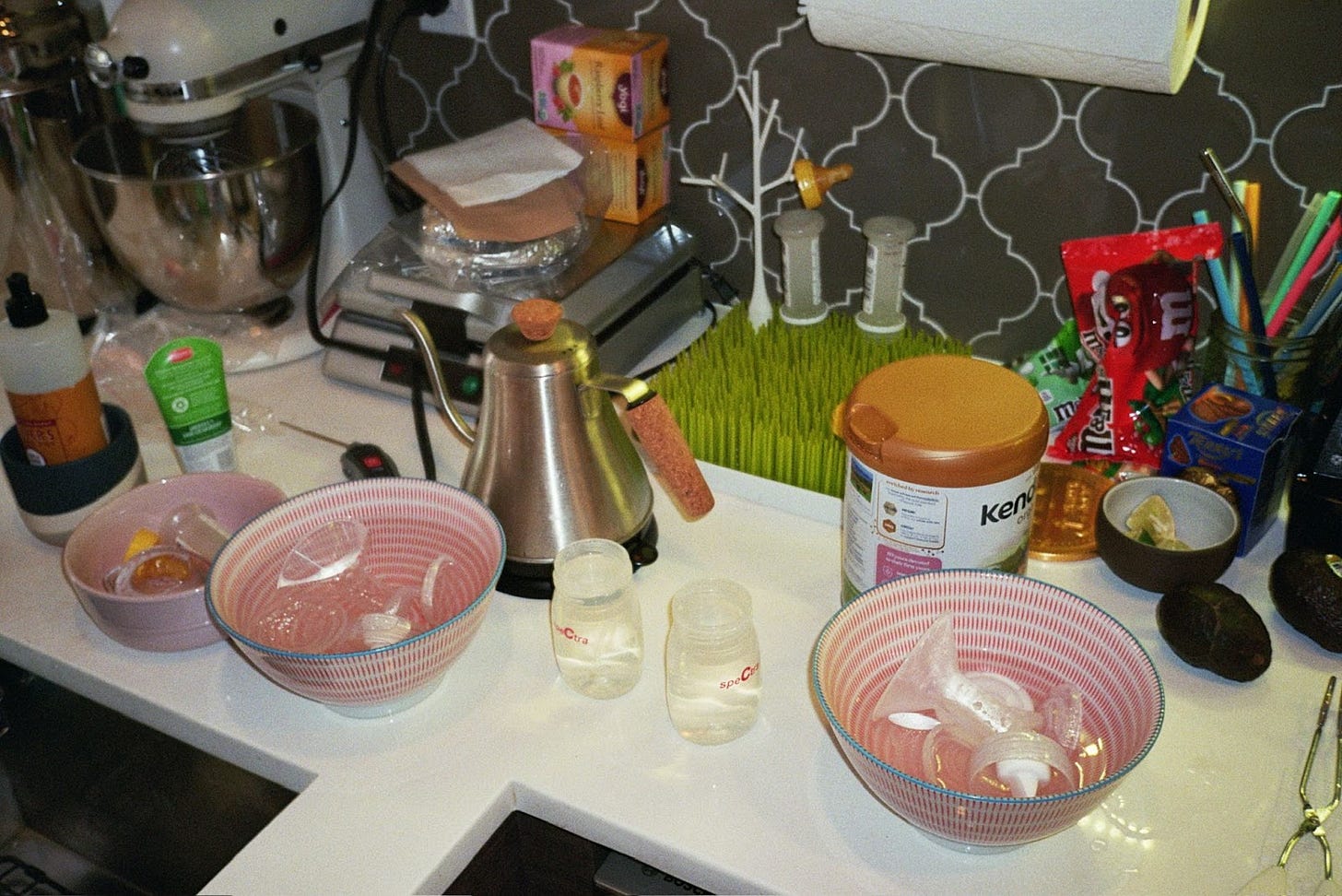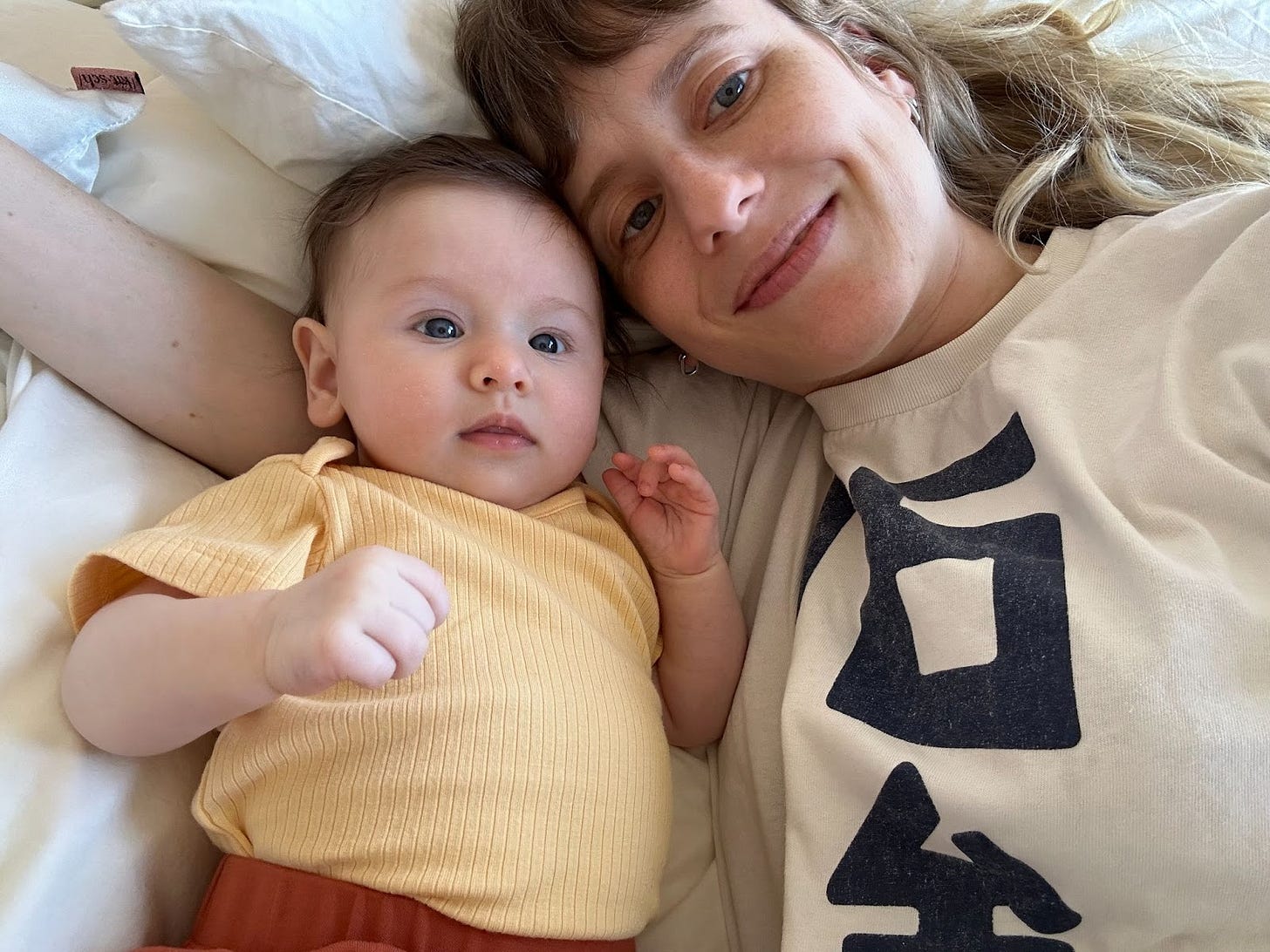I could start with the quiet, lonely hours before I pushed my daughter out, tangled up in hospital wires and terrified. I could start with the tender darkness of our recovery room, the beam of Avi’s iPhone flashlight on my chest as I learned to breastfeed, tears tracing my cheeks at the white-hot pain. I could start with our alarms: midnight, 2am, 4am, 6am. Or the nurse who held my hips while she lined my underwear with four thick pads, more than I thought could fit in a single pair. Imagine the feeling: Her warm hands on my cold skin, telling me she’d seen it all. Maybe I could start in the sterile hallway on check-out day, where I stood joylessly in a new black sweatsuit, weeping because I needed a wheelchair and was told to just walk.
I could begin, more viscerally, with what happened to my body: perineal tear, urethral prolapse, sciatica, hemorrhoids, nipple trauma, milk clogs, sleep loss, hormonal apocalypse. An internal wound the size of a dinner plate. I could offer you a visual: the industrial trash bag my mom set up next to the toilet to collect my diapers filled with blood. The blood! It didn’t stop for six weeks. I could pick any number of the brutally fragile beginnings I experienced last November, those core-shaking moments stacked so high and so wide they permanently moved my center. But I’m going to start with our first night home, with one of the tiny, formative dramas that unfolded during the hours we used to sleep.

We might have listened more closely when our friend Erich told us this night would be the hardest, or taken it as a sign, when it took me 10 minutes to climb the two flights of stairs to our apartment (while crying), that we’d need all the help we could get. Instead, like fools, we told my mom we wouldn’t need her until the next morning. Our reasons made sense at the time. We’d just spent two nights in the hospital with our new baby; we figured this night would transpire in roughly the same way, which wasn’t to say easily, but predictably. Tomorrow we’d have a better idea of how my mom could help, we said. As if the help would need to be plotted and specific, rather than supplied in the urgent vein of a paramedic.
The hours between 7pm—when my parents decamped to their nearby Airbnb—and 3am passed like a BandAid being slowly ripped from the skin. Here was our new baby, so soft and rotund, with a tiny pair of lips sprouting like a tulip in the spring, and she was wailing. Was she hungry? We just fed her, but it felt like a needle to my nipple. Had I done it wrong? Should we give her formula? What was in that stuff the hospital gave us? Did we have time to re-sterilize the bottle? Maybe she was tired. Actually, cold. But what if she wasn’t, and by adding layers we made her too hot and she died in her sleep? Oh wait, she stopped! Don’t move. Don’t speak. Let’s try to nap for 45 minutes before we have to feed her again. Rearrange the details and repeat this for several hours. Sleep deprivation turned out to be the easy part, a problem with only one solution: keep staying awake. The rest felt impossible.
It was just after 3am when I made the mistake of adjusting my pillow with my left arm, causing a sharp pain to rip through my bicep. I froze in alarm, then tried to move it and cried out. Horrified, I wiggled to the edge of the bed, the narrow part not blocked by the bassinet. Every muscle in my body ached like I’d climbed a mountain. I still couldn’t walk, engage my core, or endure the downward pressure of sitting up. Pulling my legs back for five hours of pushing then learning to breastfeed had strung my arms taut like chalky tightropes. At least, up until that point, I could still use them. With my arms I could lift the baby and feed her, feed myself, change our diapers. It felt like the bare minimum; apparently it wasn’t.
Not wanting to wake Avi, who’d just fallen asleep for the first time in days, I hobbled to the living room couch to fall apart in peace. My arm was paralyzed into a chicken wing. I’d cried a lot since birth, but these were real cartoonish sobs. I’d never felt sorrier for myself in my entire life. When I caught my breath, I called my mom with my right arm. No answer. I limped toward a bottle of Advil, but couldn’t get past the lid’s child lock without both hands. I let Avi get a blissful 10 before I woke him. He jumped when he clocked my hysteria, fearing the worst. No, no—it was just my arm. I couldn’t move it. He gave me Advil, told me he was going to brainstorm while he peed, that when he returned we would figure things out. This is how those days worked: Every minute so pressing we had to pencil in our bathroom trips.
While he was gone I tried my mom again. “Everything okay?” It was her middle-of-the-night voice. I remembered it from all the times I roused her as a kid. Nightmares, fevers, stomach aches. She was coming over. For days afterward I pictured it: My mom scrambling through Bedstuy in her pajamas at 4am. Thirty-four years since I was born and she was still ready to run when I needed her. Finally, I understood why.
Breastfeeding was off the table. I could not hold the baby, who was now crying in my mom’s arms. Avi and I called the doula, who sleepily helped us hatch a feeding plan: timing, amounts, limits. My milk was still coming in. I needed to learn to pump, right now, and I needed to pump every two hours. The baby would have formula in the meantime. I called Harling, who was up with her three-month-old. She taught me how to finish building the pump my sister started building for me the day before. I measured my nipples. She texted me the settings I needed; a foreign jumble of numbers I punched in with the focus of a hacker in an action movie. Avi brought me a heating pad for my arm. He coated the pump flange in olive oil to soften the yank. My mom set up a make-shift sterilizing station in the kitchen: ramen bowls, pasta tongs, tea kettle. It was the middle of the night and our apartment was abuzz.
It’s strange to look back and recognize that, in a way, things felt better that night after shit hit the fan. There were the hours before I pulled my arm, as Avi and I anxiously debated how to do things correctly. And the hours after, as we moved sloppily forward with the help of several women. I think of the former as a crisis of preference (wanting to get it right) and the latter a crisis of survival (having to get it done). These are different modes of operating. I often think I’d prefer to consider my options, but there’s a release in simply choosing one.
Some of the best advice I heard in those first weeks of parenthood was to spend less time debating what to do and instead simply ask myself what I could do—just one idea—then try that. The point being that this would lead me not toward the right choices, necessarily, but the right mistakes. The ones I needed to make in order to become a specific mother to my specific daughter. This approach involves a bit of “following my gut,” but I like that it doesn’t presume the gut is some mysterious hidden compass, an inner North, but rather something that must be honed. Something that can be wrong! A mistake with a purpose, one tailor-made for me.
I used to think following my gut was more like hunting for treasure. I thought it involved quiet reflection; the humble work of separating the truth from the false gods that beckoned my weaker parts (fear, ego, greed). Maybe it is like that sometimes. But when it comes to caring for a baby, I’ve found there’s no inner truth without at least a little experience, a little mess, a lot of trying the wrong thing one more time before finding something that works—at least for now. People love to revere “the mother’s instinct,” as if it were bestowed upon conception by her ovaries. In most cases, I think it’s earned.
There have been so many moments after that first night home when Avi and I have had to scrap our hand-wringing about getting things “right” in favor of an untested path forward. There’s wisdom in this shift, in momentum itself, in well-meaning missteps into new territory. This is how I became a parent. I think it’s how we grow up, too. I recently rediscovered that first entry in my pumping log: Fifteen minutes at 4:51am, a single ounce of milk. My heart swelled at my tender effort. A mother now even to myself.
To call this transition “difficult but meaningful” doesn’t begin to capture it; the qualified phrase almost insults it. Becoming a mother is the hardest thing I’ve done by far, and still it’s no match for the giddiness that gallops through my body when Sunny laughs, as if the bell just rang on the last day of school. It’s no match, even, for the brown tufts of hair that curl around her ears, or the way her starfish hands wander gently around my neck, exploring her new world. I’m lost, found, bleeding, home. I’m leaning over her bassinet to make sure she’s sleeping, but she’s grinning at me, and I’m grinning back.
My maternity leave is officially over. Thanks for giving me a few months to lose my mind! This Tuesday on the podcast, my friends Harling, Crystal, and I will be answering some of the questions you all asked about having a baby, like what’s shocked us, and whether our relationships are withering on the vine. This Friday will mark the triumphant return of 15 things (I’ve consumed so much). If you downgraded to free because I was away, I’d like to cordially invite you back on the paid boat:
Thank you, thank you! I’m so grateful to be back.
Haley
p.s. Comments are on this time because I miss talking to you! We’re also recording the podcast tonight, so feel free to drop more questions for us to answer, if you have any.







I was already crying, but then this:
“Thirty-four years since I was born and she was still ready to run when I needed her. Finally, I understood why.”
So glad you’re back. Loved reading this. Sunny is so effing sweet. And you are right that mother’s instinct is definitely earned. ❤️
Welcome back Haley! Sunny is so cute. I’m in awe you have the words to write so insightfully and beautifully mere months after the fact, and I’m really sorry that you had such a tough start. As a subscriber I’d say don’t feel too much pressure to go back to 100% output straight away - I think we can cut you some slack for a few more months of maternity leave transition!